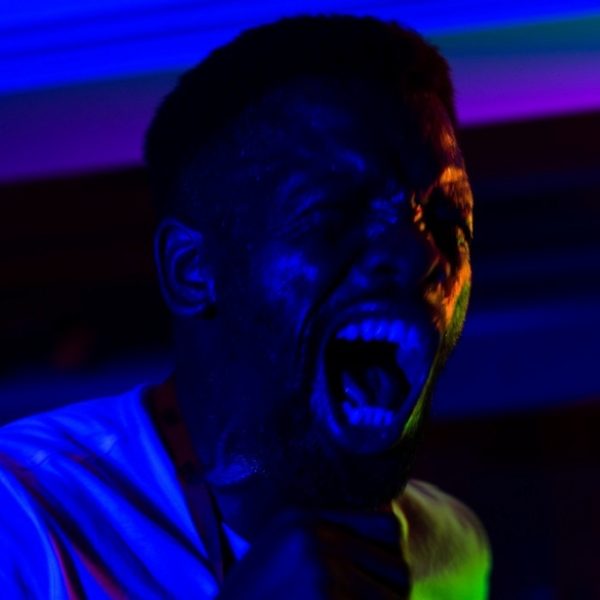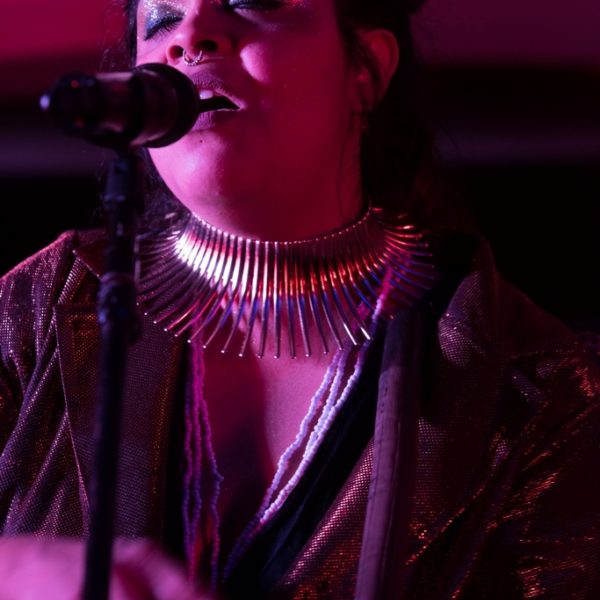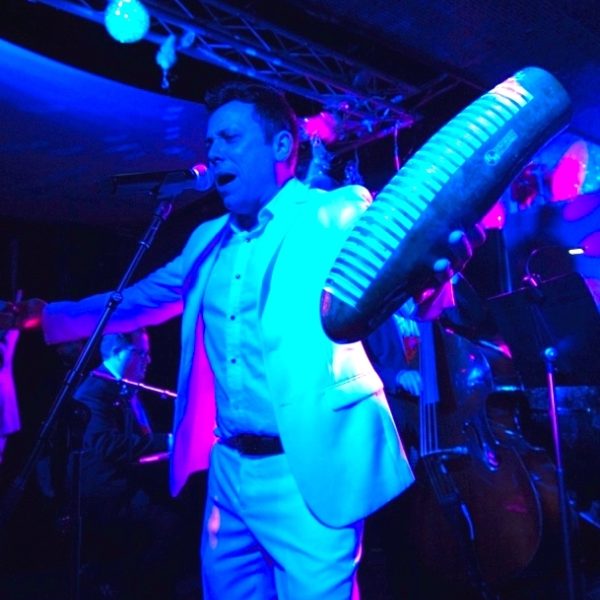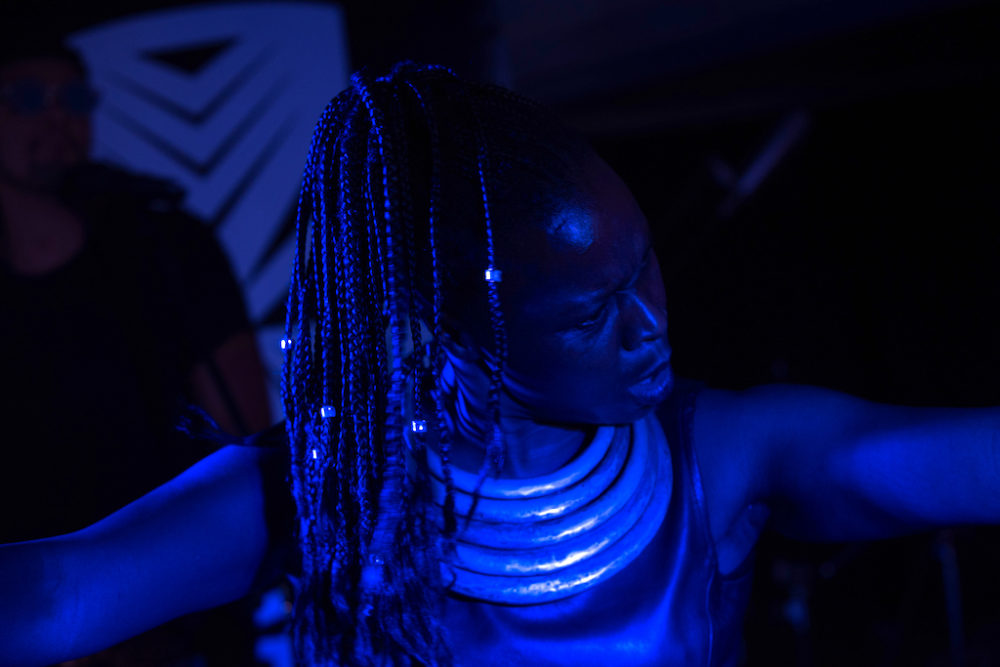
Gato Preto’s origins are as elusive as their black cat namesake. Their lead singer, Gata Mysteriosa, came to their current homebase of Dusseldorf, Germany, from Mozambique by way of Lisbon, while the producer, Lee Bass, has a Ghanaian father and a German mother, and the only thing about their live show that they refuse to compromise are the Senegalese elements. They’re futurists happy to dabble in folk styles. It gets complex.
Afropop has spoken to Gato Preto on two separate continents now, having run into them in Cabo Verde in 2017. The day before globalFEST 2019 we sat down with Gato Preto in New York, to talk about their process, how they pick collaborators and why Afrofuturism is an old tool that’s perfect for the current moment.
Gata Mysteriosa: Come on, we are Gato Preto here! We make some Afro-Futuristic music. I am Gata Mysteriosa and this is Lee Bass and we’re doing Afro-Futuristic electronic music. We’re mixing African music, some of the world music like kuduro, favela funk and Afro-house mixing with the normal electronic vibes and of course scratching the traditional African music like with djembe and saba and yeah that’s us, Gato Preto.
Ben Richmond: Where are you from?
We are basically based in Germany. I am from Mozambique, Portugal but I moved to Germany a couple of years ago. And Lee Bass is half-Ghanaian, half-German and our percussion man from Senegal also lives in Germany so we are all based in Germany which is very central to travel around the world so we are quite happy about that.
The slightly different question: You’ve said your music is from Ghana, Mozambique, Angola and Lisbon, how do you put those things together?
Lee can explain a bit better but we just go with the feeling. We just have a beat. It doesn’t have to be from Mozambique or whatever, or kuduro specific from Angola. We just go with the feeling and we just bring our Portuguese vibes and then we produce it further. And most of the time we produce with people from all over the world. And they don’t even have to be African. For example We have some Russian colleagues, Brazilian, some colleagues from France, I mean, South Africa of course but also from South America, like Colombia, so we are very connected worldwide. We are African so that is the movement but we are really open about our music and what we do and what we integrate.
I think that a lot of the bands playing at globalFEST, some of them are doing older styles—the mambo band—whereas you have more of the modern or contemporary sounding. You have the hand percussion which is pretty unique but then there’s the futuristic bent and the more modernistic elements like trap beats. How do you balance those?
That’s Lee Bass’s finger and mixing. I also cooperate a little bit with the production, but the thing is we start with our own sound. That’s why I say we don’t start with the very specific style or sound, we just go with the flow and sometimes we go to a concert, we listen to something and we’re like “oh this beat is dope, we gotta do this” and we just make it our own. This is the 21st century so you really can do anything and we are really open about that and we don’t limit ourselves in which kind of music we are doing, especially as an African. African music already reduced to African music and there are so many types in there that we don’t have to play traditional. There are traditional elements in our music but we don’t have to only do that. We can do whatever we want to do and I think that’s the edgy thing about us. We really don’t want to satisfy a particular audience; we mix what we want.
Lee: Yeah a good example of how we work is when went to Cape Verde a few years ago we were collaborating with Cape Verdean artists. I brought a beat and they picked the beat and they were like “Oh, this beat sounds like Mendinga Carnival.” And we’re like “Oh, what is Mendinga?” and they explained the rules that they celebrate and they have this kind of chanting, you know and we were like, “O.K., let’s do it.” And they recorded the vocals over that beat and then we added some guitar, some Cape Verdean guitar.
And I guess that’s what makes us unique. That we’re not afraid to listen to new things and be inspired, and since we don’t have anything to lose, we have something to win. We can just play around like little kids. As the first audience we have to be happy with it. Our biggest audience is ourselves. We don’t care about the audience.
G.M.: I mean we do care…
Lee: Well, no, not during the production. We’re not like, we need a pop song like this or a song like that. Our sound is already there, we just put in new ingredients and that’s very exciting and we’re going to perform a new song from an upcoming album. We haven’t performed it yet, well we have once before but it’s the first time for a big audience and it’s exciting, you know? We just have a single we recorded in Cape Verde. It’s on Spotify, it’s called "Mendinga Carnival."
Is it ever intimidating finding new collaborators? When you approach someone new to collaborate how does that go?
It depends. First of all we go with the energy of the person. When we click and we like each other it’s easy. I guess every artist has something special but the main thing is they have to be open. They cannot restrict themselves. If they’re going to be open like we are, then it’s easy, you know. It’s very easy. It always depends. Every artist has something special. Everyone.
Let’s go over what everyone does in the band.
G.M.: I’m the vocalist, the front-person, the show-biz person. I’m like the face and Lee Bass is like the producer, the music master so he gives the music. We do have a third person that the most time is around, our djembe player mostly from Senegal. This is where we get very picky because this is the couple of traditional elements that we have that we need to stick to it-- especially live. Now we are traveling so we have to be flexible. We also have two dancers —optional but if they can have Senegalese dance knowledge, and if that’s not possible then African dance knowledge, West African dance knowledge. If that’s not possible, well then we have dancers most of the time—two dancers. But the smallest unity is me Lee plus a djembe player.
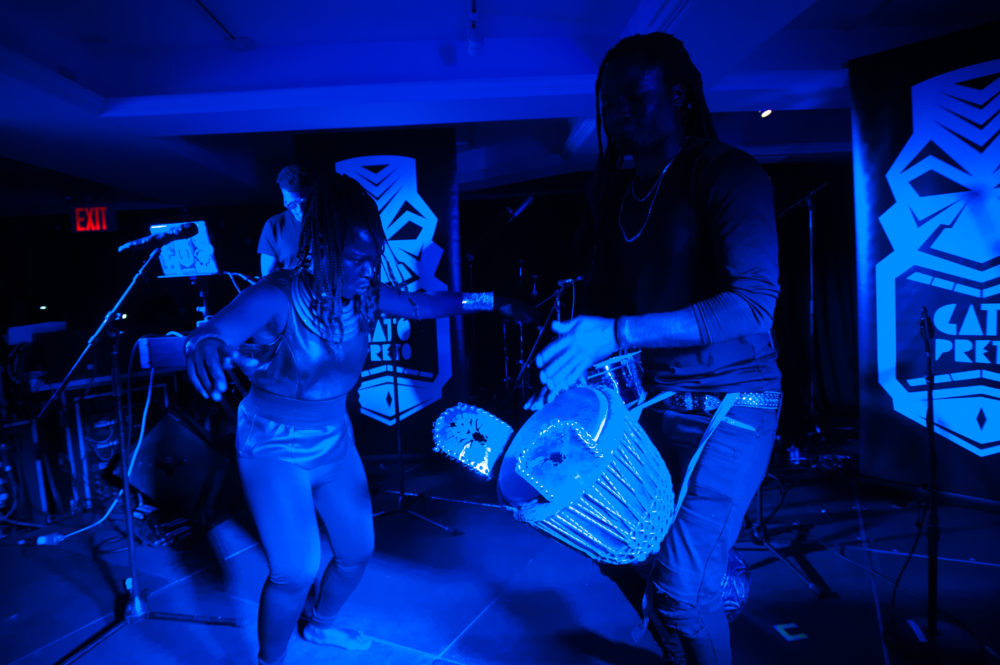
So you start with beats when you’re composing?
Lee: I mean it depends. Sometimes you have like guitar or an instrument and you build around it, but the equipment I use is pretty simple. I have a sound card and a mixer—a little Makki mixer and then of course like an iMac and then plug-ins. And then of course MIDI keyboards and things like that. Some outboard equipment like compressors. It’s pretty simple, you know we want it to sound analog. It should breathe. Since we are doing electronic music and of course we have some analog elements, it should have that analog feeling and that’s why you have that dynamic in the sound.
Yeah it’s pretty open sounding. Maybe the hand percussion is part of that but how do you get that?
I think it’s the mix, you know? The mix and the plug-ins we use, like how we mix it. And it took some time to figure out the right sound for us. It’s easy now but back then it was not too easy to integrate, for example an analog guitar or West African guitar or instrument and put it in that universe. Sometimes you have the feeling that the guitar is not inside of the whole production or the djembe is not inside or the drums are not inside and I guess that’s the tricky thing about these fusion sounds, to make it sound right. And that’s what a lot of people are lacking. Sometimes the production is great but it doesn’t feel right, but it’s too much of the guitar or too much of the beat but it’s tricky sometimes, it’s tricky to find the right way to mix it.
When do you come into the production, Gato Mysterioso?
G.M.: Sometimes it’s a little bit tricky because Lee does a lot so I don’t always take every beat. Sometimes I say this beat is nice but it just doesn’t…click. And sometimes I just do some lyrics, sometimes I play some instruments or I think about the composition part of the song and I try to put it inside and sometimes we just let the beat run.
And for me if the beat doesn’t talk to me, there’s no way, really. Sometimes he’ll have to force me, like “this is a cool beat, c’mon” and I’ll be like yeah but I don’t feel it. And at the end of the day, when I’m on the stage at the end of the day if I don’t feel it I can’t give a good performance. There’s one song, I won’t say which one, but the energy goes a bit down. This is a compromise I do as myself as an artist, that I do representing the band on stage like being the voice of the band on stage that if I’m committed to the sound and if I deliver the energy we need and everybody’s going to be on that. But if I’m like “O.K., I do that” so I’m very picky there. But once we’ve got that we work really fast.
Lee: And I have to say, she doesn’t say the truth about what she’s doing. She’s very good at like very harmonies and all that because she’s also a singer and that’s the part I can’t do. The harmonic things, for example like the new album that "Chakala" track we’re going to play, there’s some harmonies where we play some chords, that’s her part, that’s something she has to do because she has to sing all these harmony things where there are more voices and we are singing but there are a lot of voices in the whole chorus and that’s her part you know.
For the old album I did more because there was more of the tough beats but the new album is a little different. There are still those elements but there are three or four songs where there are a lot of harmonies and really complex chords or complex things inside going on. Which people might not realize but people who are familiar with music production or composing they’re going to be like “nice nice.” That’s like the next step. It’s nice. We have to up the level. We’re not satisfied with what we did. We always move forward.
Are you on tour now? What kind of audiences do you connect with most and where have you found them?
G.M.: We are blessed and very lucky that we can play all over the place and another thing we are lucky about is that we can play any time of the day. Initially I thought our music was after 12 like club music but really we have so much experience playing during the day. Like Chicago Square Roots festival? We were playing like 2 p.m. and it still worked with children and older people.
When you have the right energy on stage and you play for the audience people will see it and feel it and really embrace you. When I play for myself it’s for myself, but when you give it to the audience, they feel that. We have been really blessed about that and lucky that the resonance has always been very very good and we are working steady. We don’t make big jumps like now we have 20,000 fans more. We go steady, we go slowly. But the people we reach are faithful to us, they are real fans we are building a stable fanbase. And everywhere we are, people are really committed to us and this is for me what art is for. When you can reach people, when you connect people positively that’s cool.
Are you familiar with any of the bands you’re playing with tomorrow?
I’m very happy to reconnect with them again, because we played at South by Southwest with Combo Chimbita. She’s also like a power girl so we’re like we connected after the show, so we’re really supporting each other and what we’re doing and I’m a big fan of their music.
I don’t know if you’re going to be able to see the show. As an artist the energy you really have to deliver is so big you have to be really conscious of where you are playing. We are wishing a good resonance for the show.
47Soul, we met them in Europe and in Luxembourg and the show was just amazing. These guys, you see, we’ve met people in different parts of the world and then we meet here and it’s funny.
We’re the last three bands playing and it’s like it “cool guys we‘re here.” Everyone’s really generous to each other, no ego. Everyone’s just like “have a good show.” And these are just the bands we personally know from contact from talking and from watching shows.
The other bands, when you’re in the world music scene, it’s not a big world. You come across the music and with their arts and I’m looking forward for this program is so wide. It’s recommendable for everybody to come and watch it. But it’s sold out so….
You think you could collaborate with 47Soul?
We’d be awesome. I mean there are different kinds of collaboration, like remixes.
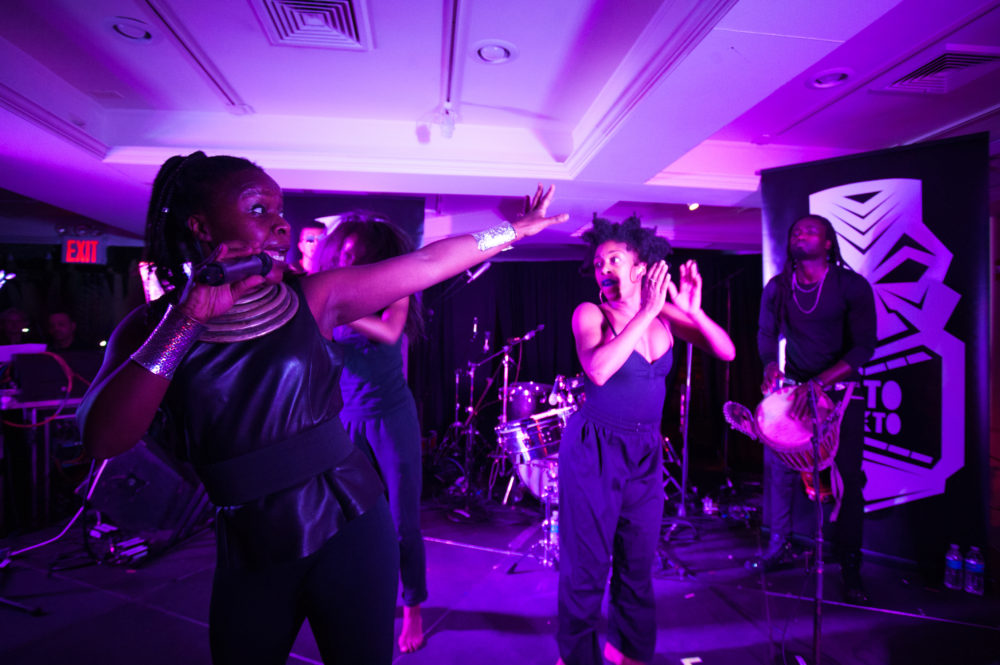
I always think of Afrofuturism in an African-American context—Parliament and Sun Ra. Do you draw from that? And what do you change as someone with a closer continent connection?
G.M.: The Afrofuturism term is not new, and it’s not only about music. It’s about arts and science and literature, it’s about painting, writing, dancing, singing, being a performer, being a genius being somebody that has an idea and being African. Because our culture has been ripped for a long time. This is one way of coming forward and working with these thematics but having a greater posture.
What Sun Ra was doing so we could solve the racist matter, he has to go to the future. It’s crazy but it’s like, O.K. if we can’t manage what we’re doing, we have to go to the future. So he has to go through space to get his message that he has to bring love and peace to earth and he comes back with a very important message, and it’s a very nice approach to use in a film with music to tell people we have to stop and think about it.
And even science fiction has always been there to prove, not advise but guide people. Like “what we’ve been doing has not been working, we have to use new technology moving forward. We’re not doing anything different or anything new. Only after the Black Panther movie this phrase became new again.
Which is good. It is about time because, it’s like you were saying in the beginning, when people are used to hearing an African act they are used to traditional African approach. But Africans are so much more than traditional approach. There is so much more. Children even build their own toys. They don’t buy the toys so it’s so futuristic. They take what they have and make instruments. Children say I want a guitar or drums O.K., I’m going to build that. It’s so Afrofuturistic because it’s like wow you’re taking something that nobody wants and making something new for you that you need. Nobody would ever come to this idea so it’s a very broad term but we are lucky to be in it because we really want to sensibilize people about some social issues. And we use our music and our edgy visuals to do that. That’s what we can do as an artist, be a reflection of our times but use an extravagance so people look and see. So it’s nothing new.
Lee: We’re also going to shoot a short film for the album and we’re going to present a whole new show which comes along with that short film. It’s a big year. A lot of things happening. The movie we’re probably shooting in February and March. And we’re already working on the album and with the movie we’re working on some more cinematic things for the movie, the short film.
Are your lyrics also Afrofuturist themes?
G.M.: That’s the funny thing: My themes are very normal. That’s what Sun Ra had, that’s what George Clinton had. Things that happen now but nobody’s looking at it, nobody’s paying attention to them. This is about child abuse for example, or women’s rights—women who don’t live in the U.S. or Europe, if you don’t get the right education you don’t have a chance—or police violence, social differences and poverty growing up. A lot of normal social issues that we’re living now.
Lee: The most important thing is, we’re not just talking about black people. It’s not about black or white, the issues affect everyone. And that’s something people need to realize. Like Afrofuturism or science fiction doesn’t offend people, because as soon as we put on some futuristic clothes we’re colorless. As soon as we try to raise a finger on the topic the people don’t feel offended. They don’t say “Oh they’re black, blah blah blah.” Of course we’re colored, but I have a white mother and we live in Germany and we’re also Europeans, we’re more European than African. So we’re talking for everyone not one ethnic group. That’s something for us, what we explore our universe and of course there are problems but if you don’t want to listen to the lyrics, you can’t understand the lyrics, you dance. But if you listen to the lyrics or you watch our videos, you’re going to say, oh O.K., that’s interesting. If not, just enjoy the visuals.
And that’s important for us. I don’t want people to feel bad but at the same time I want to try to change something in the world. And that’s our approach to it. And that’s why we wanted to shoot a movie. We have the music album and the music video but the film that’s another thing. That’s like our expression. I would say when we’re not here anymore people will watch it and be like, oh. Maybe in 10 years, 20 years 50 years. I have to say we are a little bit ahead of the time. Six years ago we were way too fast but people are now catching up.
Well is there anything else you want to say to the Afropop audience? Any other shoutouts?
Yeah, maybe big shout out to the whole globalFEST team. They really supported us a lot. Also a big shoutout to SXSW because that opened a lot of doors. And of course a big shout out to you guys. You’ve always supported us. You did an article about our video a few years ago, and that helped us also a lot. A lot of people saw it from the States and you know, big up.
Related Audio Programs
